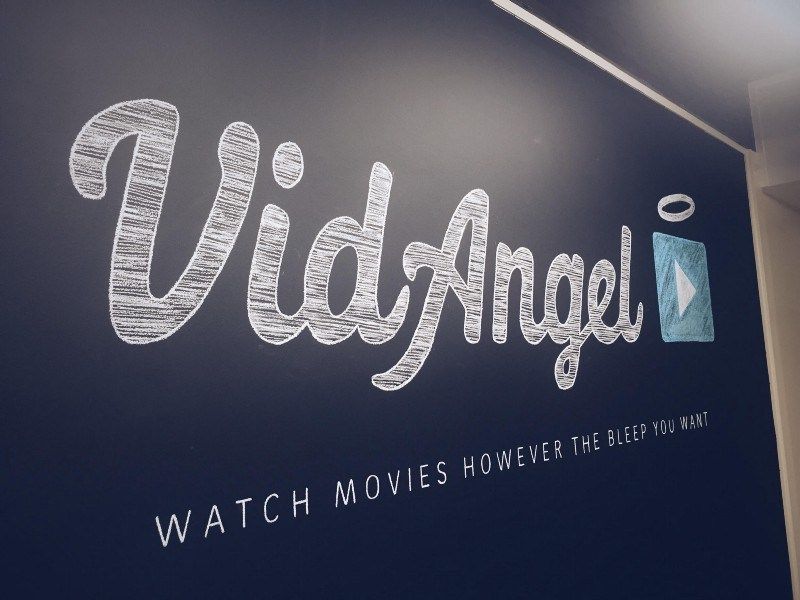“I just think that, in this instance, the studios are wrong.”
This week VidAngel announced that attorney David W. Quinto resigned his position at a prestigious Hollywood law firm to lead VidAngel’s defense in the case brought forth by Disney, Lucasfilm, 20th Century Fox, and Warner Brothers. To people not in the know, people like me, that means nothing. But people familiar with entertainment law read that and yelled “SHUT THE FRONT DOOR!”
“It’s like Derek Jeter leaving the Yankees and joining the RedSox,” says VidAngel spokesman Matthew Faraci. And he says that because Mr. Quinto has over thirty years of experience defending Hollywood big timers, including plaintiffs in the VidAngel case. So why the sudden 180? Mr. Quinto explains, “I have never before been adverse to a studio. I just think that in this instance, the studios are wrong, and I like to feel that I’ve always tried to be on the right side of the law and I’m confident that [in joining VidAngel] I am.”
Obvs, the VidAngels are thrilled to have Quinto on their side. CEO Neal Harmon says, “David’s decision to join VidAngel as General Counsel represents the single most significant development in the case to date.” Harmon praises Quinto’s career successes which include representing the ©OSCARS, the ACADEMY AWARDS® and the Producers Guild of America. Quinto has also represented clients dealing with matters of Internet law, much like the matter VidAngel finds themselves dealing with now. “There is no one better suited to oversee our legal strategy,” Harmon says. “[Tuesday]’s announcement demonstrates [Quinto]’s full confidence that values consumers seeking to filter content will prevail in court.”
One could infer, if one were inclined, that Quinto would not leave his prestigious position to fight this case if he did not believe this case is one VidAngel can win. “I think VidAngel has the better side of the legal argument by far,” Quinto says. “Legislative history of the Family Movie Act reflects that Congress felt strongly that the American people should have the right to watch filtered content and that right should exist as a reality. The ability to watch filtered content should be as cheap and easy and widespread as possible.” Quinto explains that VidAngel and ONLY VidAngel offers the means for consumers to easily, affordably, and legally access filtered content. “It seems that because Congress affirmatively wanted to make this service available, and because VidAngel is complying with the letter of the act, it has the better side of the argument,” Quinto says.
Let’s talk more about that argument, shall we? We gave you a brief overview of the studios’ complaint and VidAngel’s response (you’re welcome), but if the lively debate in the comments is any indication, we all still have some questions as to how VidAngel plans to defend their services in court. Mr. Quinto answered many of those questions during our phone interview and the path forward seems much clearer to me. Any confusion you have after reading these next 1,000 words should be blamed on my writing skills, not VidAngel’s legal strategy.
I first asked about the studios’ claim that VidAngel needs their permission to decode DVDs. “Everyone who watches a DVD must decode it,” Quinto explains. “So long as Hollywood has been selling copies, they have been encrypted.” Encryption (which must be decoded) existed before the Family Movie Act, so the studios’ assertion that VidAngel needs their permission would make the Family Movie Act a right available only on paper and not in reality.
Mr. Quinto then addressed the studios’ claim that VidAngel makes unlawful copies of the studios’ content. “It is a necessary step in providing their service that VidAngel not only decode the disc, but that they make a copy. That is a technological requirement,” Quinto says. The coded copy of a film is tagged to identify objectionable content, then broken into segments and sent to servers that make it possible for consumers to stream the content fluidly. “That is all necessary to provide the very service that Congress expressly authorized,” Quinto says.
Copyright law is where things start to get really murky for me, given my lack of a law degree. I have seen some write that what VidAngel does is a violation of copyright law. Quinto claims that in fact, it is not. “Within copyright law there are some broad exceptions that apply. What I’ve argued so far is that what VidAngel does is squarely in the law,” he says. Quinto explains that even if the court rejects Quinto’s explanations for decoding and copying content, VidAngel can still argue that what they do falls under Fair Use. “Under the Fair Use analysis, one looks at the benefit to the public and the harm to copyright law. Here there is no harm to the studios,” Quinto says. The studios point to the Digital Millennium Copyright Act in their complaint but Quinto says the DMCA does not apply in this case. “The DMCA that [the studios] rely on was enacted in response to the very widespread file sharing that was occurring with music. That is not the situation. There are no copies going on the internet. The studios are not being deprived of any realities,” he says. Quinto also mentions that the 9th Circuit Court has ruled that a transformative work does not infringe on the original work. By filtering content VidAngel is transforming original works.
But what about the streaming license the studios claim VidAngel needs to stream content? “The Family Movie Act says that if you do certain things, you are lawful, period. Anything else that follows is irrelevant,” Quinto says. The filtering model authorized by congress does not require a streaming license. Under VidAngel’s model, requiring a license would be double charging since VidAngel purchases actual physical discs per customer streaming a film at any time. “The consumer, having purchased the disc, has the right to watch that disc without having the license to do so,” says Quinto. What’s making the studios mad is VidAngel’s ability to offer content earlier and for less money than other streaming services. The weird thing about that though is that VidAngel would love to purchase a streaming license. That’s a whole lot of work, time, and money if VidAngel could stop purchasing thousands of discs, storing those discs, and auditing those discs. And if they had a streaming license, there would be no limit to the number of customers that can watch any of VidAngel’s titles. As it is now, the number of customers streaming a title must match the number of physical discs VidAngel has in its vault. But the studios won’t sell VidAngel a streaming license.
Once upon a time The Directors Guild, which is apparently a thing, entered into an agreement with the studios. Directors argued that movies are works of art and that when movies are altered, the artist is degraded. So the studios agreed that they would not permit alterations. But then they did. They alter films to be shown on television. They alter films to be shown on airplanes. They alter movies anytime doing so will mean making large sums of money. VidAngel, as disruptive as it is, is still relatively small, and so considered by studios as unworthy of the right to alter — and therefore stream — the content they so subjectively defend. The directors made their artistic integrity argument before congress when the Family Movie Act was being debated, and congress decided that the argument held little if any water since the compromises studios and directors make in the process of film production are well documented. “Ultimately I believe that when VidAngel becomes sufficiently large and successful, the studios will change their position and grant streaming licensing,” Quinto says.
And he’s confident that VidAngel will become large and successful because he believes the law is on their side. “VidAngel is consistent in protecting the rights of content owners to be paid. And VidAngel is providing the service that Congress has said should be available to American people. This is not a situation where people are trying to get around the law,” he says. But proving that is going to take a while, and until then VidAngel faces a possible injunction. “In weighing whether to grant an injunction, the court must consider public interest,” Quinto explains, then adds that VidAngel would like to get as many messages from the public as it can expressing why VidAngel’s filtering service is important and a right worth protection. “Send an email to VidAngel (support@vidangel.com) explaining why you believe filtering is important and what it would mean to you if that service became unavailable,” Quinto implores.
Additionally, VidAngel is allowing the public to contribute to its legal defense. Many customers contributing little amounts of money (think $5.00) will allow VidAngel to show the court how many people believe in the service VidAngel offers. To contribute, email support@vidangel.com and a member of their team will send further instructions.
We’ll continue keeping you up to date on the VidAngel saga.








